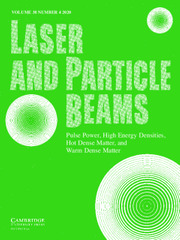Article contents
Generation and transportation of high-intensity pulsed ion beam at varying background pressures
Published online by Cambridge University Press: 13 September 2017
Abstract
High-intensity pulsed ion beam (HIPIB) technology is developed as an advanced manufacturing method for components with improved wear, corrosion and/or fatigue performance, etc. Robust HIPIB equipment with stable repetitive operation, long-lifetime, and easy maintenance are desired for industrial applications, on which stability of ion beam parameters is critical to achieve consistent result of reproducibility. Here, magnetically insulated ion diodes (MIDs) as ion source with durable graphite anode are investigated in a simple self-magnetic field configuration under repetitive operation. Influence of background pressure on ion beam generation and transportation is emphasized since ion beam sources were intrinsically a vacuum-based system. Comparative experiments were conducted on two types of HIPIB equipment, that is, TEMP-6 and TEMP-4M, differing in vacuum packages where turbo-molecular pump or oil diffusion pump was used. Both the HIPIB equipments are operated on a bipolar pulse mode, that is, a first negative pulse of 150–200 kV with pulse duration 450–500 ns to generate anode plasma on explosive electron emission, and a second positive pulse of 200–250 kV with 120 ns to accelerate the ions. Ion beam energy density up to 8 J/cm2 is achievable using MIDs of geometrical focusing configuration, and the total energy, energy density distribution along cross-section, deflection and divergence, and charge neutralization of the ion beams are assessed under background pressures in a wide range of two orders of magnitude, that is, 1–100 mPa. No appreciable change in the parameters is observed up to 50 mPa, and merely a slight increase in the beam deflection from about ±3 mm to about ±4 mm at the focal point over 50 mPa. The stability of ion beam at the varied pressure is mainly facilitated by the higher pressure up to several Pa in anode–cathode gap during plasma generation and good neutralizing effect for ion beam transportation.
Keywords
Information
- Type
- Research Article
- Information
- Copyright
- Copyright © Cambridge University Press 2017
References
REFERENCES
- 6
- Cited by

